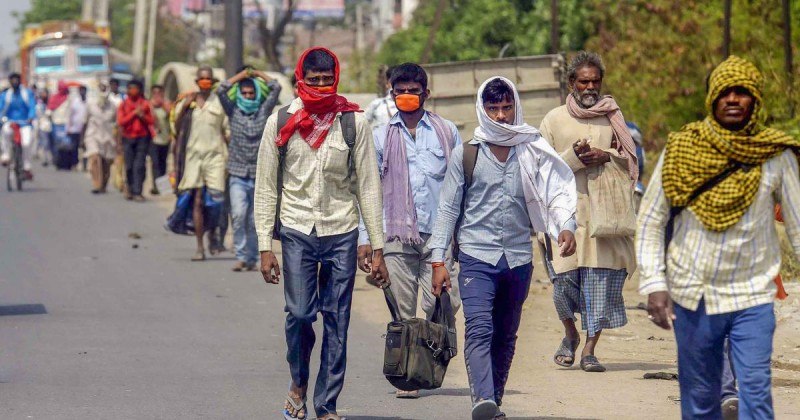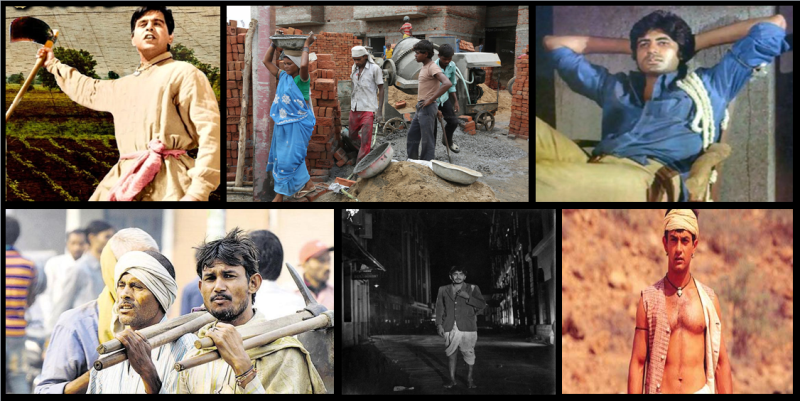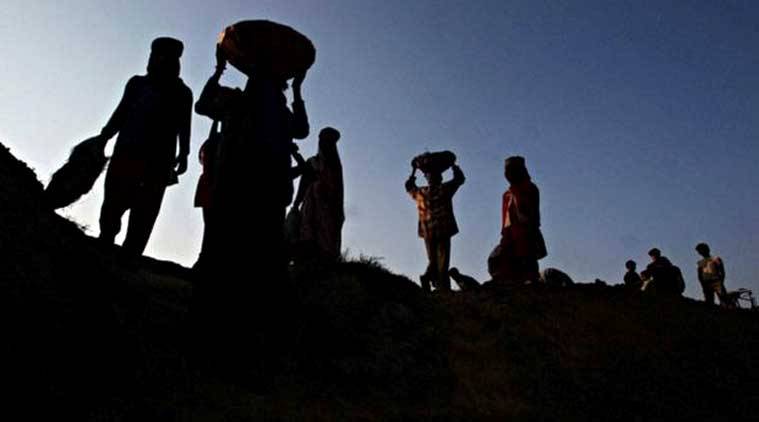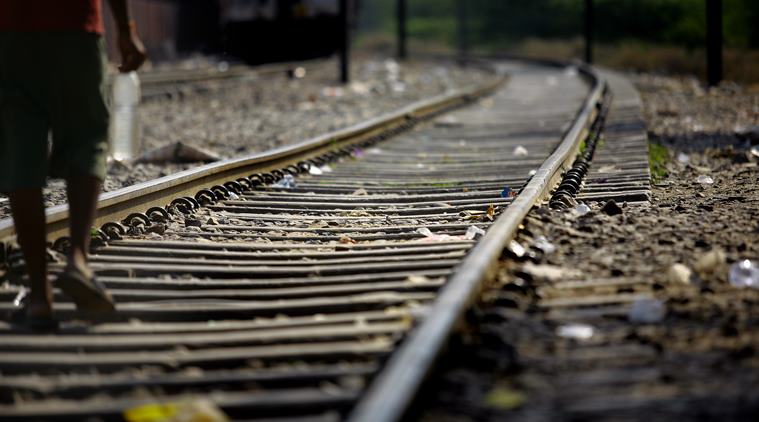
In the Zero Hour of Parliament, the Central government was asked if it noted the number of deaths of migrant labourers walking back home during Central government-enforced Lockdown and was compensation paid to the next of kin of those deceased? To this, the government replied in five words that echo through our deeply disturbing reality, “no such data is maintained”. It is saying that this is not an issue that the state could bother itself with. It is a reality that the state could not be invested in. What was further deafening is the silence over it, the dismissal and the resignation of the vocal sections of society. No outrage anywhere, no questions asked, no expression of solidarity. There clearly is a hierarchy of lives and of deaths for the most vocal sections of our society, and it is evident in the blasé and blatant admission of the government that “No such data exists”.
Invisible Deaths and Precarious Lives
Death, much like life is only real in how intimately it is experienced. What lives are to be read, which ones can be suppressed in the dominant discourse. What deaths must move a nation to collectively experienced overwhelming emotions of lament and outrage bordering criminal outburst. However, there is a relation between the lives and lived experiences that are suppressed in dominant discourse and deaths that are distant and invisible, even if the corpse lay in the backyard. These deaths, much like the lives these were, are distant not by virtue of physical separation but by mental separation. These realities occur to us as incapable of rising from our backyards, catching up to us, and holding us responsible. We express shock at the visuals of a toddler trying to pull away the shroud covering his dead mother’s corpse, while simultaneously looking for ways to build our distance from it. The goriness of death is hard to ignore so we watch, even if somewhat voyeuristically but we quickly reclaim ourselves from it, establish distance. This distance restores the life-affirming lies that provide a precious sense of security, in a context (like India) where escaping hunger, death and precarity is a marker of privilege. This sense of privilege breeds the political apathy that is today reflected in a majoritarian state. A state that, courtesy its majoritarian support base, no longer feels the need to shroud the goriness of its apathy towards the lesser poorer subjects. Unlike, the popular saying ‘people get the government that they deserve’. This socio-political apathy, the ability to identify with and feel invested in groups other than one’s own, is the opposite of empathy, the kind that brings people out in solidarity.
Deaths that are reported as big numbers inspire awe and shock but not empathy. It is unfortunate to know about deaths happening but not really moved by it. The socio-political apathy makes deaths seem like an inevitability with some sections of the population, so a farmer commits suicide or a Dalit woman in Uttar Pradesh is raped and killed, the privileged masses read inevitability of those deaths in the precarity of those lives. It is not a matter we expect the political agency to address. That’s beyond the point of redemption. How is the state exonerated by the privileged masses? Why does such a blatant exhibition of socio-political apathy not inspire solidarity? Have we become numb, then why are those visuals of a dead mother on News Media, encapsulated by advertisements for middle-class consumer products?
State Apathy and Suppression of Lived Experience of Precarity
While the government was appealing to the apathy of privileged masses and claiming oblivion on deaths, Stranded Workers Action Network (SWAN) in a report released state that the total number of migrant workers who died due to lockdown-migration related issues stands at a whopping 971. Of these, starvation and financial distress (combined) claimed 216 lives, lack of medical care took 77 lives, 209 died in road or train accidents, deaths in Shramik Trains (reported by railway ministry) were 96, suicides 133, deaths in quarantine centers stood at 49, lockdown associated crimes claimed 18 lives, police brutality claimed 12, alcohol withdrawal killed 49, exhaustion claimed 48 lives, and 65 died of unclassified reasons. This is a well-documented record of a disturbingly high number of human casualties caused by manufactured humanitarian crisis.
It is further clear how far the state is removing itself from responsibility by claiming that the lockdown-migration was set-off due to panic created by fake news. The government was prepared to meet the essential requirements of all. This assurance does not agree with the reports that kept pouring during the lockdown. SWAN reported that about 85% of those who had returned home or were in transit had paid to go back home. Two-thirds of these had paid upwards of Rs. 1000 to make the journey. It also reported that 80% of 5911 individuals who reached SWAN, had received no rations from the government.
At this point, it is clear that the lived experiences and death are being suppressed by a dominant narrative. The narrative that is being built through these two responses (we have no data, and fake news and ignorance killed those people) is much in line with explanations littered through television news media at the time. It resonates with the questions posed to the migrant labourers as they were making a perilous journey risking being assaulted by the police, starved and stranded. “Why do you want to go back?” reflects how distant our media, our news, our privileged audience has become from ground realities, lived experiences of these workers. The inability to understand why would they want to leave, why can’t they just eat the rice and dal that is given in ration; why to risk the lives of their children with disease and death; why not wait for the lockdown to be over; why not maintain social distancing; is representative of this mental distance we have cultivated. The utter poverty of imagination that facilitates a distance and the sense of privilege that comes from being distant. A distance that then informs our fragile sense of security. This distance the privileged vocal sections of society live in reduces the lived experiences of precarious lives irrational, ill-informed, almost stupid accidents borne out of individual choices; and deaths then appear inevitability: sad, unfortunate but acceptable. The state apathy then is one (of many) instances of power going awry, more importantly, it is representative of broader relations of power, not between the state and the subjects but between the privileged and the precarious sections of the population. The state is merely reproducing these dynamics of power, and so the silence of popular news media and major newspapers, the silence and glossing over by the privileged section of the population is understandable.
The State, The Privileged and The Precarious
What is the power dynamics of the state, the precarious sections of the population and the privileged sections of the population (not inclusive of capitalists, but certainly shaped by market forces). The socio-political apathy rests on distance from precariousness for the privileged, as I have already illustrated above. This apathy reflects in distancing of oneself from responsibility and political agency characterized by two oft-heard sentences (‘but what can we do about it?’). The privileged section distances itself from the state, while still empathizing with it in that it is government’s job to protect the vulnerable, but how much can the government also do. The base understanding is that this isn’t ‘OUR’ issue. The privileged vocal section will not express outrage at the ever-growing crisis of farmer suicides and farmer agitations in this country but the day prices of “common goods” like vegetable increase, we outrage, we question, we resist. Even so, the perception of what constitutes a worthy issue is defined by echoes within the privileged vocal section. The more resonance, the more confident one feels to lend it one’s precious voice. Further, if solidarity and vocalizing threaten our precious sense of security and suggests we may lose our privileged distance we recede.
Meanwhile, for the precarious section of the population, the poor, a long history of apathy has sedimented into resignation from exercising political agency, resulting in the understanding that this government is not for ‘US’. The realization that change in government wouldn’t bring any change has been hammered down by years of the lived experience of precarity. Their lived experience of precarity is a direct product of failed social and economic networks of support, making them disproportionately vulnerable to violence and arbitrary rules. Those who are ruling have changed, but the power dynamics have not because the power dynamics are not just between the state and precarious populations but also between precarious and privileged sections of populations (which hasn’t changed and is reflected in state attitude).
The Nation States, Gayatri Chakravorty Spivak in her essay on cultural translation, highlights are built upon the backs of stateless people, and in the process of its formulation also creates stateless people. These stateless people are the precarious lives and the inevitable deaths. Who counts as a citizen is not a simple direct consequence of residing within the national boundaries. There clearly is a gradation of who counts as a citizen, and how much. Spivak notes that indigenous poor in many of these contexts have acquired dominant language in order to be represented by politics and law. Their existence in the urban spaces is contingent on their ability to make themselves count and politically organize and lobby. In this organizing and lobbying, the individual experiences of precarity lead to the formation of a solidarity and sometimes emplacement (Roy, 2017). However, instances like those of state-imposed lockdown break the networks of negotiation and support that these vulnerable sections depend on in one quick stroke. Therefore, the lived experience of precarity is collective experience but without any support to be able to dig one’s heels and negotiate. The precarious do not get a chance to performatively claim a right where one has been denied. As in this case, with a four-hour notice, the precarious were denied any possibility of collective action or organizing, any possibility to dialogue—the possibility of using other forms of support to address crisis/threat in one domain. For instance, using their networks to find a job when they’ve been laid off unceremoniously or using their economic and spatial foothold in the city to negotiate with political pressure. Lockdown was a sudden, complete and all-encompassing crisis with multiple networks of possible social, political and economic support being snapped in one stroke. Rendering the collective experience of precarity extremely individual lived reality, a scenario where numbers do not translate to significance as in electoral process.
It seemed until this point that the state apathy reflects in the reduction of deaths into ball-park figures, obfuscated facts and abstract reasoning. The statistical records of those who died each year, clubbed into categories bracketed by vague explanations had so far typified the state’s indifference. In the politics of independent India, the 971 who have died have been reduced to further lesser than a cold ball-park figure by state. State and privileged section’s socio-political apathy has reduced their lived experience of precarity and their deaths to five words, “No such data is maintained”.
Smriti Singh teaches Sociology at the Department of Social Sciences and Humanities, Indraprastha Institute of Information Technology Delhi.












